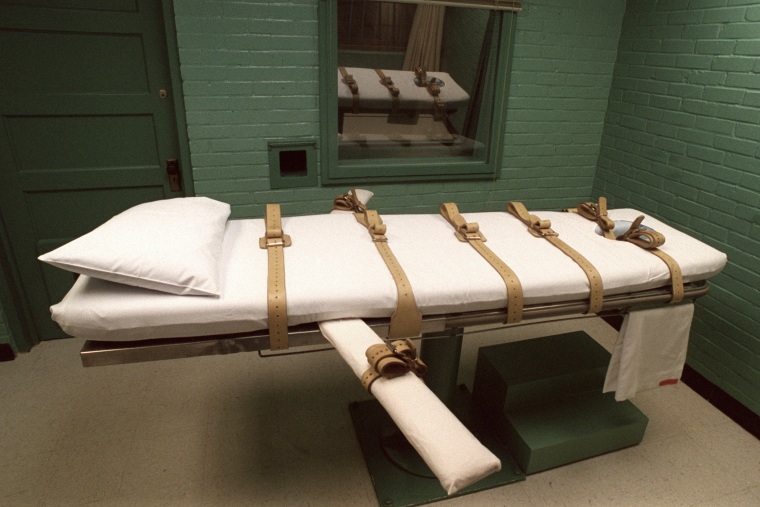The 5th Circuit Court of Appeals has issued a last-minute stay of execution for Robert James Campbell, 41, on the grounds that he did not have a "fair opportunity" to argue that his IQ is too low.
Campbell's attorneys argue that Texas prosecutors withheld evidence of recently discovered, low mental proficiency test scores. The 5th Circuit sent the case back to a trial judge to decide whether Campbell is eligible for a new round of appeals.
It does not appear that the state intends to challenge today's ruling.
The execution was scheduled for 6 p.m. Central Standard Time Tuesday, just two weeks after Oklahoma botched the lethal injection of a death row inmate who was seen writhing and moaning before he eventually died 43 minutes later.
"The Fifth Circuit's decision today creates an opportunity for Texas to rise above its past mistakes and seek a resolution of this matter that will better serve the interests of all parties and the public," Campbell's attorney Robert C. Owen said in a statement. "Mr. Campbell has been fully evaluated by a highly qualified psychologist -- a member of the Texas Board of Examiners of Psychologists, appointed to that post by Governor Rick Perry -- who confirms he is a person with mental retardation," he added.
The U.S. Supreme Court ruled in 2002's landmark case, Atkins v. Virginia, that executing mentally disabled individuals violates the 8th Amendment's ban on cruel and unusual punishment.
Israel Santana, cousin of Robert James Campbell's victim, Alejandra Rendon, had a different reaction: "It's a joke," he said of the ruling. "He's intelligent enough to commit a crime. He's intelligent enough to tell someone to run. He's intelligent enough to pull a trigger."
A federal appeals court denied a stay of execution earlier Tuesday for Campbell, who was convicted of raping and killing a 20-year-old Houston bank teller.
Oklahoma inmate Clayton D. Lockett writhed and moaned after authorities administered a lethal, three-drug cocktail that failed when his vein reportedly collapsed. He eventually died of a heart attack, 43 minutes after the execution began.
Of the procedures that went wrong in Oklahoma, Campbell’s lawyers contest that the lack of transparency of how these execution drugs are made, and from where they come, creates dangers of a repeat scenario for their client.
Procedures on lethal injections in the U.S. continue to operate in a shroud of secrecy. Many states throughout the country are running low, or have already used up, supplies of lethal drugs after companies began taking a moral stand and refused to manufacture them.
Without the drugs, states are left to improvise on lethal injections, relying on compounding pharmacies to mix drugs for similar effects. Authorities argue that the identities of the pharmacies that create the drugs must be protected over potential threats from death penalty opponents.
Oklahoma authorities said issues with Lockett’s veins tripped up their usual procedure. The state delayed its next scheduled execution by six months to review its procedures as opponents came forward arguing the botched execution signaled an urgent need for reforms. Even President Obama commented on Lockett’s execution, calling it “deeply disturbing.”
Authorities in Texas remain confident they won’t mess up Campbell’s execution.
Republican Gov. Rick Perry, a staunch supporter of the death penalty, defended the use of capital punishment amid concerns over how Lockett died. The state’s attorney general, Republican and gubernatorial candidate Greg Abbott, contests that Texas’ protocols are “vastly different” from Oklahoma’s. “I have no indication or evidence or reason for concern that we will have happen in Texas what happened in Oklahoma,” he said.
If anything, Texas is well-practiced in the art of killing convicted criminals. The state leads the country in capital punishment. If executed, Campbell will be eighth in the state to see the death penalty just this year.
Unlike Oklahoma, Texas has a one-drug procedure, using the barbiturate pentobarbital.
Campbell's attorneys warned that an inmate executed by the drug earlier this year described how he felt his "whole body burning" and that the Food and Drug Administration does not regulate the drug's production.
"That gives us great concern that we are introducing cruel and unusual punishment into the process," Ross said on MSNBC.
The single-drug approach was favored by a panel of experts last week who called on sweeping death penalty reforms to end methods using untested drugs and combination cocktails to execute individuals. The panel’s recommendations come after a study released last month found that more than 4% of death row inmates may actually be innocent.
